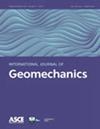Experimental and Model Study on the Time-Dependent Permeability of Rock Fractures Induced by Mechanical Creep
IF 3.3
2区 工程技术
Q2 ENGINEERING, GEOLOGICAL
引用次数: 0
Abstract
Fracture permeability is one of the critical factors affecting thermal production in hot dry rock reservoirs. Mechanical creep can cause temporal reduction of fracture permeability. However, the study solely on mechanical creep is limited, particularly under high confining stress. In addition, a physics-based stress- and time-dependent permeability model is essential for predicting the in situ geothermal production. This work aims to study the mechanical creep on the time-dependent fracture permeability. Long-term flow tests through single fractured granite samples under constant loading (20, 35, and 50 MPa, respectively) and stepwise increased loading (20 → 35 → 50 MPa) were conducted. The influence of the loading stress on the creep rate and the influence of the time on the permeability damage were quantitatively investigated. Based on the experimental data, a permeability model considering both stress and time effects was established based on viscous–elastic mechanics. According to the study, we obtained the following conclusions: (1) A higher constant confining stress can result in larger creep deformation, a larger damage ratio of hydraulic aperture (eh), and a longer duration of rapid reduction of eh. (2) The previously accumulated creep deformation can affect the subsequent time effect on the temporal evolution of eh when the loading stress changes, causing eh rapid reduction stage to weaken or disappear. (3) The transient creep behavior of eh can be described by the Kelvin creep model, and the maximum damage caused by the creep deformation is almost linearly proportional to the loading stress. The increase in stress caused by the bridging effect between adjacent contact asperities can dramatically reduce the creep rate. (4) The established permeability model can effectively predict the permeability with change in both stress and time considering the effect of accumulated creep deformation on the subsequent creep deformation, and it can be easily implemented in numerical simulation.岩石力学蠕变裂隙渗透率随时间变化的试验与模型研究
裂缝渗透率是影响干热岩储层产热的关键因素之一。机械蠕变可引起裂缝渗透率的暂时性降低。然而,仅对机械蠕变进行研究是有限的,特别是在高围应力条件下。此外,基于物理的应力和时间相关渗透率模型对于预测地下地热产量至关重要。本工作旨在研究随时间变化的裂缝渗透率的力学蠕变。分别在恒定载荷(20、35、50 MPa)和逐步增大载荷(20→35→50 MPa)下,对花岗岩单破碎试样进行了长期流动试验。定量研究了加载应力对蠕变速率的影响以及加载时间对渗透损伤的影响。在实验数据的基础上,建立了考虑应力和时间影响的粘弹性渗透率模型。研究得出以下结论:(1)恒围应力越高,蠕变变形越大,水力孔径(eh)损伤比越大,eh快速减小持续时间越长。(2)加载应力变化时,前期积累的蠕变变形会影响后续时间效应对eh时间演化的影响,导致eh快速减小阶段减弱或消失。(3) eh的瞬态蠕变行为可以用Kelvin蠕变模型来描述,且蠕变变形造成的最大损伤几乎与加载应力成线性关系。相邻接触凸点之间的桥接效应引起的应力增加可以显著降低蠕变速率。(4)所建立的渗透率模型能够有效预测考虑累积蠕变对后续蠕变影响的随应力和时间变化的渗透率,易于在数值模拟中实现。
本文章由计算机程序翻译,如有差异,请以英文原文为准。
求助全文
约1分钟内获得全文
求助全文
来源期刊

International Journal of Geomechanics
ENGINEERING, GEOLOGICAL-
CiteScore
6.40
自引率
13.50%
发文量
374
期刊介绍:
The International Journal of Geomechanics (IJOG) focuses on geomechanics with emphasis on theoretical aspects, including computational and analytical methods and related validations. Applications of interdisciplinary topics such as geotechnical and geoenvironmental engineering, mining and geological engineering, rock and blasting engineering, underground structures, infrastructure and pavement engineering, petroleum engineering, engineering geophysics, offshore and marine geotechnology, geothermal energy, lunar and planetary engineering, and ice mechanics fall within the scope of the journal. Specific topics covered include numerical and analytical methods; constitutive modeling including elasticity, plasticity, creep, localization, fracture and instabilities; neural networks, expert systems, optimization and reliability; statics and dynamics of interacting structures and foundations; liquid and gas flow through geologic media, contaminant transport and groundwater problems; borehole stability, geohazards such as earthquakes, landslides and subsidence; soil/rock improvement; and the development of model validations using laboratory and field measurements.
 求助内容:
求助内容: 应助结果提醒方式:
应助结果提醒方式:


